The Whole Town's Talking

Brief Synopsis
Cast & Crew
John Ford
Edward G. Robinson
Jean Arthur
Arthur Hohl
James Donlan
Arthur Byron
Film Details
Technical Specs

Synopsis
Arthur Ferguson Jones is late for his job as an advertising clerk for the first time in his life, just as he was about to be given a raise in salary by his bosses, Seaver and J. G. Carpenter. While Jones's contrition enables him to retain his position, the unrepetant attitude of another late employee, Wilhemina "Bill" Clark, the object of Jones's unspoken love, causes her to be fired. She points out to the staff the resemblance between a picture in the newspaper of the escaped convict "Killer" Manion and Jones. While Jones lunches at a restaurant, the obsequious Hoyt also notices the similarity and turns Jones over to the police in expectation of a reward. Seaver establishes Jones's identity, but to protect him from another mistaken arrest, he is given a special passport to show wary policemen. Back at the office, "J. G." encourages Jones, an aspiring writer, to sign a deal with newspaperman Healy to author a special serial on his own appraisal of Manion. The three men get drunk together, and Jones later kisses the thrilled Clark and orders Seaver to put her back on the payroll. However, Manion waits for Jones at his apartment and demands the use of the passport at night to protect him during criminal undertakings. Although for the first time in Jones's life everyone is deferential toward him, and Clark affectionately asserts control over his career, Jones lives in perpetual fear of Manion. The publicity-seeking criminal demands that Jones's newspaper series be turned into his reminiscences, which raises the suspicion of authorities. Clark innocently visits Jones's apartment and does not recognize Manion until it is too late. The district attorney orders that Jones be placed under protective custody in prison, but Manion takes Jones's place to kill fellow gangster, "Slugs" Martin, who turned stool pigeon on him. After the murder of Martin and the release of the supposed Jones, the disappearance of Seaver and Clark tips off authorities to the true state of affairs. Manion plans to have Jones killed in a police ambush to convince them that Manion is dead. However, Jones forgets his wallet and returns prematurely to the hideout while Manion is with a girl friend. The gangsters unintentionally reveal to Jones his fate, and when Manion returns, Jones, who had passed up an earlier opportunity to murder Manion, accepts their offer to shoot the man they believe is Jones but is really Manion. Jones then grabs a machine gun, locks up the criminals, and frees their prisoners, Seaver, Clark, and Jones's nagging Aunt Agatha. Meanwhile the persistent Hoyt, still trailing Jones in the belief that he is Manion, has summoned the police just in time. Jones and Clark marry and take his long hoped-for trip to Shanghai.

Director
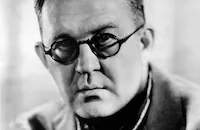
John Ford
Cast

Edward G. Robinson

Jean Arthur
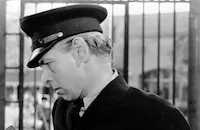
Arthur Hohl
James Donlan

Arthur Byron
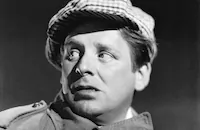
Wallace Ford
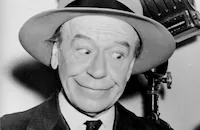
Donald Meek

Etienne Girardot

Edward Brophy

Paul Harvey

J. Farrell Macdonald
Effie Ellsler
Robert E. O'connor

John Wray
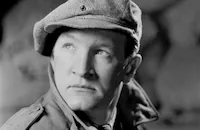
Joseph Sauers
Frank Sheridan
Clarence Hummel Wilson
Ralph M. Remley
Virginia Pine
Ferdinand Munier
Cornelius Keefe
Francis Ford

Emmett Vogan
Sherry Hall
Charles Sherlock
Brooks Benedict
Don Brody
Bob Stanley
Ned Norton
Jack Santoro
Charles Cross
Robert E. Homans
Pat O'malley
Frank O'connor
Philip Morris
Charles Hickman
Jack Richardson
Ky Robinson
Grace Hale
Walter Long
Gaylord Pendleton
Jules Cowles
Kit Guard
Steve Clark
Harry Abrahams
Maston Williams
Harry Wilson
Ben Taggart
William L. Thorne
Brady Kline
Ethan A. Laidlaw
Eddie Hearn
C. A. Bachman
Charles Mcavoy
Kernan Cripps
Al Hill
Ed Hart
Stanley Mack
Dutch Hendrian
Sam Flint

Bess Flowers
Gladden James
Sunny Ingraham
Arthur Rankin
Maurice Brierre
Carmen Andre
Nancy Caswell
Allyn Drake
Rosita Foucher
Richard Powell
Arthur Stuart Hull

Phillips Smalley
Harry Dunkinson
Roger Gray
William E. "babe" Lawrence
Sydney De Grey
Ivan Christy
George Frank
Carol Holloway
Mary Gordon
Irving Newhoff
Charles Sullivan
Robert Wilber
Eddy Chandler
John Tyke
Allen Caven
William Jeffrey
Ted Oliver
Floyd Criswell
Joseph E. Bernard
Desmond Gallagher
Eddie Baker
Bernadine Hayes
May Foster
Bud Jamison
Jack C. Grey
Arthur Belasco
Pat Hartigan
George Barton
Rodney Hildebrand
Allan Sears
Dick Rush
Budd Fine
Charles Mcmurphy
Vance Carroll
Harry Bowen
Harry Tenbrook
Eddie Fetherston
Bobby Dale
William Saverick
Harry Semels
Jimmy Phillips
James Quinn
Blue Washington
Lynton Brent
Edwin J. Brady
Larry Fisher
Billy West
Sidney D'albrook
Nick Copeland
Hal Price
Jack Cheatham
Tom London

Jack Mower
Harry Mount
Lee Shumway
Charles King
Stanley Blystone
Oscar Rudolph
Arthur Thalasso
Jerry Larkin
Frank Marlowe
Lew Davis

Lucille Ball
Gordon Demain
Larry Steers
Robert Graves
Lloyd Whitlock
Lowell Drew
Christian J. Frank
Pearl Eaton
Don Roberts
John Ince
Ernest F. Young
Jay Eaton
Carlton E. Griffin
Mitchell Ingraham
Monte Carter
H. Barnum
William A. Williams
Corinne Williams
Peggy Leon
Pauline High
Rita Donlin
Pardner Jones
Reginald Simpson
Charles Marsh
Marion Sheldon
Alice Dahl
Maurine Gray
Edwards Davis
Crew
Joseph August
Eddie Blaisdell
Ed Brandenberg
Cliff Broughton
Bert Campbell
John Cook
Joseph Corscia
Lester Cowan
Eddie Donahue
John Ford
James Goss
Dick La Marr
Viola Lawrence
Wilbur Mcgaugh
Paul Neal
Johnny Punter
Dave Regan
Robert Riskin
Glenn Rominger
Glenn Rominger
Charles Rose
Hal Senator
Earl Snyder
Jo Swerling
Mercy Weireter
Mel Wolf

Photo Collections
Videos
Movie Clip





Hosted Intro
Film Details
Technical Specs

Articles
The Whole Town's Talking
The Whole Town's Talking managed to sneak past the Hays office and its stringent censorship of gangster pictures because the film was treated as a farce. Nevertheless, it's hard to ignore a darker side to the proceedings which seem to endorse an extreme solution for justice. The milquetoast clerk experiences a sense of power and self-confidence only by assuming the identity of his evil doppelganger, and his manhood is confirmed when he orders mob members to carry out a death sentence.
Edward G. Robinson was already tired of being cast as gangsters when he learned through his agent as well as gossip columnist Louella Parsons that Jack Warner had loaned him out to Columbia to make The Whole Town's Talking. He wasn't at all happy about making the film, which was adapted from a novel by William R. Burnett, the author of Little Caesar. Once he read the screenplay by Jo Swerling and Robert Riskin, he changed his mind and rose to the challenge of playing dual roles. He also enjoyed an excellent working relationship with director John Ford and co-star Jean Arthur of whom he wrote in his autobiography, All My Yesterdays: "She was whimsical without being silly, unique without being nutty, a theatrical personality who was an untheatrical person. She was a delight to work with and to know."
Director: John Ford
Producer: Lester Cowan, John Ford
Screenplay: W. R. Burnett, Robert Riskin, Jo Swerling
Cinematography: Joseph H. August
Editor: Viola Lawrence
Cast: Edward G. Robinson (Arthur Ferguson Jones/'Killer' Mannion), Jean Arthur (Wilhelmina 'Bill' Clark), Wallace Ford (Healy), Arthur Hohl (Michael F. Boyle), Edward Brophy ('Slugs' Martin), Donald Meek (Mr. Hoyt).
BW-93m.
by Jeff Stafford

The Whole Town's Talking
Quotes
Trivia
Notes
The working titles of this film were Jail Breaker and Passport to Fame. Some contemporary reviews mention a scene between Manion and Jones's Aunt Agatha, that was apparently deleted in later prints. Edward G. Robinson was borrowed from Warner Bros. for the film. The Variety review predicted that this film would be a turning point in Robinson's career, which had been foundering after box office failures. Other reviews concurred with that estimation and modern sources note that the success of The Whole Town's Talking did restore Robinson's career. According to modern sources, prison footage was taken from Columbia's film The Criminal Code.
















